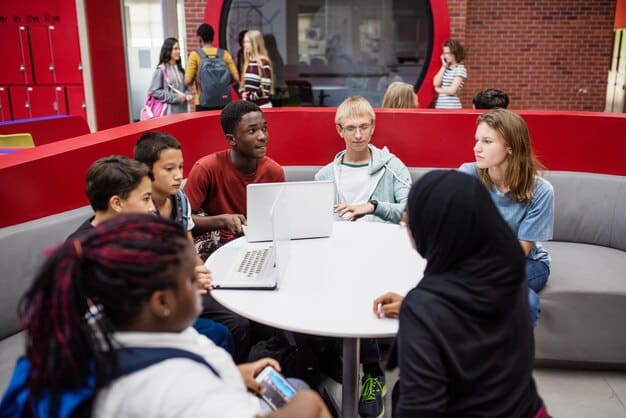Education Policy’s Impact on Public Policy Debates Quality

Exploring the Connection Between Education Policy and the Quality of Public Policy Debates reveals how investments in education systems directly influence the sophistication, inclusivity, and effectiveness of discussions shaping society’s future.
The quality of public policy debates is crucial for a well-functioning democracy. Considering that, exploring the connection between education policy and the quality of public policy debates reveals a fundamental relationship between the two. This article will delve into how different education policies directly impact the level of knowledge, critical thinking, and constructive dialogue within public discussions.
The Foundation: Education as a Prerequisite for Informed Debate
A well-educated populace forms the bedrock of productive public policy debates. Understanding complex issues, analyzing information critically, and articulating reasoned arguments are skills cultivated through effective education systems. Policies that prioritize quality education for all citizens are thus essential for elevating the level of public discourse.
Literacy and Comprehension
Foundational literacy and comprehension enable citizens to engage with policy proposals and related information. Policies promoting early literacy, reading comprehension, and critical thinking are critical in ensuring that people can effectively participate in debates on topics ranging from healthcare to environmental protection.
Numeracy and Data Interpretation
Many public policy debates hinge on statistical data and quantitative analysis. Policies that emphasize numeracy skills empower citizens to better understand and evaluate evidence-based arguments, leading to more informed decisions.

- Access to Information: Education equips citizens with the skills necessary to access and process information from multiple sources.
- Critical Evaluation: A strong education enables individuals to critically evaluate different perspectives and identify biases.
- Articulate Expression: Education fosters the ability to articulate one’s own viewpoints clearly and persuasively.
- Constructive Engagement: Informed citizens are more likely to engage in respectful, constructive dialogue.
In conclusion, a strong educational foundation empowers citizens to participate more effectively in public policy debates by enhancing their cognitive abilities. It encourages informed decision-making and contributes to a more engaged and responsible democracy.
Curriculum Design: Shaping Critical Thinking and Civic Engagement
The content and structure of a school curriculum play a vital role in fostering critical thinking and civic engagement. Policies that mandate or encourage the inclusion of subjects such as civics, history, and social studies help students to develop an understanding of democratic principles and the policymaking process.
Civic Education Essentials
Civic education is crucial for promoting awareness of governmental structures, constitutional rights, and responsibilities of citizenship. Policies that require civic education in schools help to ensure that future generations are well-versed in the fundamentals of democracy.
Historical Context and Perspective
Studying history enables students to understand the evolution of social and political issues, the impact of policy decisions, and the lessons learned from past experiences. Policies that promote comprehensive historical education enable citizens to contextualize contemporary debates.

- Debate and Discussion: Encouraging classroom debates and discussions helps students to develop their critical thinking and communication skills.
- Project-Based Learning: Incorporating project-based learning activities related to public policy helps students to apply their knowledge in practical ways.
- Community Engagement: Facilitating community engagement initiatives enables students to interact with policymakers and stakeholders firsthand.
To summarize, a well-designed curriculum focused on critical thinking and civic engagement enhances students’ knowledge and analytical skills. This equips them to confidently and effectively participate in public policy debates, contributing to a more civically responsible and participatory society.
Equal Access: Education as a Leveling Factor in Public Discourse
The quality of public policy debates is directly linked to equal access to quality education. Disparities in educational opportunities can lead to unequal representation in public discourse, as marginalized communities may lack the resources and knowledge required to effectively voice their concerns.
Funding and Resource Allocation
Policies that ensure equitable funding and resource allocation across all schools are essential for reducing disparities in educational opportunities. Underfunded schools often lack the resources necessary to provide quality education, limiting students’ ability to participate in public policy debates fully.
Targeted Support and Interventions
Targeted support programs and interventions for disadvantaged students can help to bridge achievement gaps and promote equal participation in public discourse. These may include tutoring, mentoring, and access to technology and other resources.
In conclusion, providing equal access to quality education is a crucial leveling factor in public discourse. By ensuring that all citizens have the opportunity to acquire the knowledge and skills necessary to participate in debates, we can foster a more inclusive and representative democracy.
Teacher Training and Development: Empowering Educators to Facilitate Informed Debate
The effectiveness of education policies in shaping public policy debate heavily relies on the quality of teachers and their ability to facilitate informed discussions. Continuous professional development for educators is vital, as it equips them with the skills and knowledge needed to foster critical thinking, encourage constructive dialogue, and instill civic values in students.
Ongoing Professional Development
Policies should prioritize ongoing professional development for teachers, focusing on methodologies to promote critical thinking, media literacy, and civic engagement. Workshops and training programs can provide educators with innovative strategies to facilitate engaging and informative discussions.
Curriculum Alignment and Support
Ensuring that teacher training aligns with curriculum goals is crucial. Policy support should include providing teachers with the necessary resources and materials to effectively integrate public policy discussions into their lessons. This ensures that educators are well-prepared to guide students through complex topics.
- Skill-Building Workshops: These workshops can focus on methodologies for encouraging thoughtful analysis of policy issues.
- Resource Provision: Providing teachers with access to diverse and up-to-date materials ensures comprehensive instruction.
- Community Engagement Training: Educating teachers on how to involve students in real-world civic activities fosters practical understanding.
Ultimately, investing in teacher training and development is essential for empowering educators to facilitate informed debate among students. These investments contribute to a more knowledgeable and civically engaged society, capable of addressing complex issues with insight and understanding.
Media Literacy: Navigating the Information Landscape and Promoting Discerning Analysis
In the digital age, media literacy is crucial to navigate the information landscape and discern credible sources from misinformation. Education policies must adapt to include comprehensive media literacy programs that empower students to critically analyze news, social media content, and various forms of digital communication.
Critical Evaluation of Sources and Content
Policies should require educational programs that teach students to evaluate the credibility of sources, identify biases, and distinguish between factual information and propaganda. These skills are essential for forming informed opinions and participating constructively in public policy debates.
Promoting Responsible Digital Citizenship
Media literacy education should also emphasize the responsibilities of digital citizenship, including ethical online behavior, fact-checking, and respectful communication. These principles help create a more civil and productive online environment, crucial for meaningful public discourse.
- Source Evaluation: Instructing students on assessing the reliability and agenda of information origins.
- Bias Detection: Teaching how to identify and understand biases present in various media outlets.
- Digital Ethics: Promoting responsible online interactions, including recognizing misinformation and ensuring respectful online dialogue.
In conclusion, incorporating media literacy into educational policies is essential for cultivating discerning citizens who can critically evaluate information. By equipping students with these skills, we foster a well-informed public capable of engaging in productive and evidence-based policy discussions.
Higher Education’s Role: Shaping Tomorrow’s Policy Leaders and Contributors
Higher education institutions play a crucial role in shaping tomorrow’s public policy leaders and contributors. As centers of research, innovation, and intellectual discourse, universities and colleges provide the advanced knowledge, analytical skills, and ethical frameworks necessary for informed policy-making and quality public debates.
Advanced Policy Analysis and Research
Policies supporting research and academic programs that focus on policy analysis, economics, and social sciences are critical. These initiatives cultivate expert insights that can inform policy decisions and enhance the depth of public discussions.
Fostering Interdisciplinary Collaboration
Encouraging interdisciplinary collaboration in higher education can lead to innovative solutions and comprehensive perspectives on complex policy issues. Policies that facilitate cross-departmental cooperation enhance the ability to address multifaceted challenges effectively.
- Advanced Research Programs: Supporting scholarly investigation that provides data-driven insights on policy.
- Academic Policy Centers: Promoting centers that address critical public issues through evidence-based analysis.
- Public Engagement Initiatives: Encouraging university initiatives that facilitate discussions among experts, policy makers, and the public.
In conclusion, higher education’s role extends beyond mere academic instruction. By fostering advanced research, promoting interdisciplinary collaboration, and encouraging public engagement, higher education institutions shape knowledgeable leaders and contributors. This commitment to informed analysis and ethical considerations is essential for driving quality public policy and enriching public debates.
Long-term Vision: Continuously Adapting Education Policies to Evolving Societal Needs
Education policies must demonstrate a long-term vision by continuously adapting to meet evolving societal needs. Public policy is shaped by an array of factors, and educational institutions must prepare students for the realities and complexities of tomorrow’s challenges. Policies should prioritize flexibility, innovation, and inclusivity to ensure enduring relevance.
Adaptive Strategies for Progress
Policies that champion adaptive learning and incorporate forward-thinking methodologies can prepare students for future challenges. Education must equip students with the skills and knowledge required to excel in a rapidly evolving world.
Diversity and Inclusivity as Key Priorities
Prioritizing policies that promote diversity and inclusivity enhances the richness of public dialogue. Educational systems should strive to represent and value every individual to create a more robust and equitable society.
- Flexible Learning Strategies: Promoting methodologies that adapt to varied learning styles while integrating the latest technology.
- Continuous Evaluation: Regularly assessing and refining educational programs to meet current societal demands.
- Inclusive Practices: Ensuring equal access to quality education so every student can reach their full potential in public discussions.
In closing, long-term educational policies should facilitate adaptive strategies and prioritize diversity to equip students with essential knowledge. Continuous innovation provides students with the skills to address present challenges, enriching public discussions in pursuit of a better society.
| Key Point | Brief Description |
|---|---|
| 📚 Education Foundation | Solid Literacy and Numeracy improve policy debate engagement and comprehension. |
| 🧠 Curriculum Design | Curriculum centered at critical and civic will promote involvement on discussions about public policy. |
| 🌐 Equal Access | Equitable access to quality learning is critical for inclusive engagement on debate. |
| 🍎 Teacher Training | Qualified educators can foster debate through advanced skills and knowledge. |
Frequently Asked Questions
▼
Education enhances comprehension, critical thinking, and informed engagement, leading to more sophisticated input during discussions about public policy.
▼
Civic education ensures future generations understand governmental operations, rights, and responsibilities, fostering responsible and informed citizenry.
▼
Media literacy equips citizens to discern credible sources from misinformation, promoting better analysis and discussion in addressing public issues.
▼
Higher education fosters policy leaders by offering advanced research, analytical abilities, and ethical guides required for efficient public policy making.
▼
Continuous adaptation in education policies is vital for addressing our ever-changing and evolving society, ensuring educational programs remain relevant.
Conclusion
In conclusion, the connection between education policy and the quality of public policy debates is undeniable. By prioritizing education that promotes critical thinking, media literacy, and civic engagement, and by ensuring equal access to quality education for all, we cultivate a more informed, engaged, and constructive public discourse. Investing in education is, therefore, an investment in the health and vitality of our democracy.





